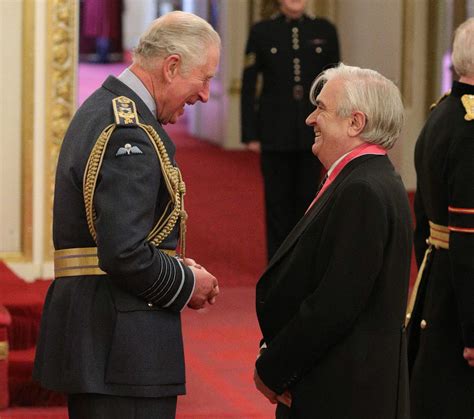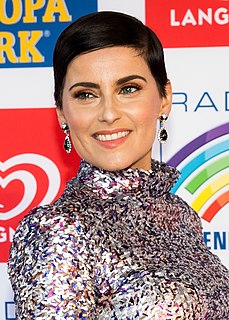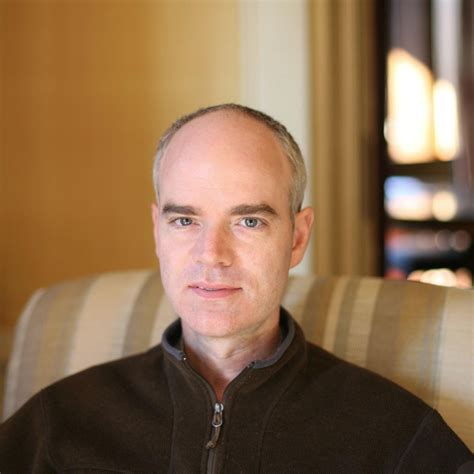A Quote by Bryan Appleyard
That books, a commodity little changed since Caxton's day, should have turned out to be the trailblazers of retailing on the internet is one of the stranger cultural ironies of our time. If you've bought one thing on the net, the newest and most prodigiously high-tech communications system imaginable, then it is almost certain to be a book, the oldest and simplest.
Related Quotes
American society is very like a fish society. . . . Among certain species of fish, the only thing which determines order of dominance is length of time in the fishbowl. The oldest resident picks on the newest resident, and if the newest resident is removed to a new bowl, he, as oldest resident, will pick on the newcomers.
If you think about human nature, our favourite pair of shoes are the ones we bought yesterday, our favourite thing is the newest thing that we have…and the thing we’ve seen the most and for the longest period of time is our reflection in the mirror, so obviously that’s going to be our least favourite thing.
I believe in the magic of books. I believe that during certain periods in our lives we are drawn to particular books--whether it's strolling down the aisles of a bookshop with no idea whatsoever of what it is that we want to read and suddenly finding the most perfect, most wonderfully suitable book staring us right in the face. Unblinking. Or a chance meeting with a stranger or friend who recommends a book we would never ordinarily reach for. Books have the ability to find their own way into our lives.
The industrial leader of the 20th century was a system-builder. He was a visionary in terms of what could be built; got the capital together; certainly convinced investors that it was possible; and then ran a high-volume production system that would spew out a vast array of almost identical goods and services. They would be changed from time to time; there was research and development, to be sure. But the system was built around production, not innovation.
Since our online libraries are so extensive, we think we can make all the right decisions about our personal health and well-being by pushing buttons. It's not intuitive anymore. That's the internet. Before the net, we would have gone to the community or our families to see what we should do. We often feel more isolated on our own little islands because of it.
I think, for me, there's The Book I Should Write and The Book I Wanted to Write - and they weren't the same book. The Book I Should Write should be realistic, since I studied English Lit. It should be cultural. It should reflect where I am today. The Book I Wanted to Write would probably include flying women, magic, and all of that.
I believe in books. And when our people [coughing] - our people of Jerusalem, let's say after the Romans destroyed the temple and the city, all we took is a little book, that's all. Not treasures, we had no treasures. They were ransacked, taken away. But the book - the little book - and this book produced more books, thousands, hundreds of thousands of books, and in the book we found our memory, and our attachment to that memory is what kept us alive.
I still love books. Nothing a computer can do can compare to a book. You can't really put a book on the Internet. Three companies have offered to put books by me on the Net, and I said, 'If you can make something that has a nice jacket, nice paper with that nice smell, then we'll talk.' All the computer can give you is a manuscript. People don't want to read manuscripts. They want to read books. Books smell good. They look good. You can press it to your bosom. You can carry it in your pocket.
John Hughes made a certain type of high school movie, and then it stayed static for 30 years. The only thing that changed was that maybe it was found footage or maybe it's a little snarkier, but the actual language that kids live in today, like with texting, motion graphics, the internet and that whole hashtag culture doesn't exist in movies today. It's left on the floor.
Perhaps the most significant thing a person can know about himself is to understand his own system of values. Almost every thing we do is a reflection of our own personal value system. What do we mean by values? Our values are what we want out of life. No one is born with a set of values. Except for our basic physiological needs such as air, water, and food, most of our values are acquired after birth.
Books have always been living things to me. Some of my encounters with new authors have changed my life a little. When I have been perplexed, looking for something I could not define to myself, a certain book has turned up, approached me as a friend would. And between it's cover carried the questions and the answers I was looking for.

































